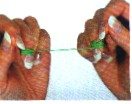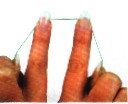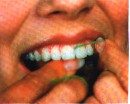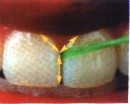 Sebo Marketing
Sebo Marketing
 October 18th, 2021
October 18th, 2021
 Flossing helps clean teeth in the areas that brushing alone just cannot reach (between the teeth and under your gum line). Flossing and then brushing helps remove plaque, a stick substance that accumulates and hardens over time. Left untreated, plaque deposits can eventually lead to gum disease and tooth decay.
Flossing helps clean teeth in the areas that brushing alone just cannot reach (between the teeth and under your gum line). Flossing and then brushing helps remove plaque, a stick substance that accumulates and hardens over time. Left untreated, plaque deposits can eventually lead to gum disease and tooth decay.
Learning the proper way to floss your teeth is important. Your dentist or hygienist will be happy to demonstrate proper flossing techniques. The basic flossing techniques are shown in the photos below.
One type of dental floss does not work for everyone. Consumers con choose between waxed or unwaxed, flavored or unflavored, and regular or tape types. In general, a waxed floss slides between the teeth easier than an unwaxed floss. Flavored floss leaves a fresh taste in the mouth, and is especially nice for those times when brushing or rinsing is not possible. Tape floss is typically thicker than regular floss and is generally favored by people with wide gaps between their teeth.
Some companies are now marketing dental floss made from newer, “space age” materials. These newer materials offer increased smoothness and are also stronger than traditional floss. Ask you dentist which dental floss is right for you.
Some people with limited dexterity or arthritis cannot easily manipulate dental floss. These people may wish to try dental floss holders or intra-dental cleaners. Whatever you needs or preferences are, there is bound to be a product that will help you clean between the teeth and under the gum line. Brush and floss your teeth daily to help ensure the wellness of your teeth.




